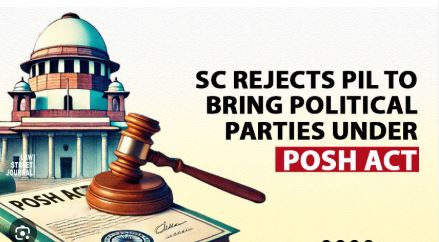

New Delhi, December 9: The Supreme Court has directed a petitioner seeking to bring political parties under the ambit of the Sexual Harassment of Women at Workplace (Prevention, Prohibition, and Redressal) Act, 2013 (POSH Act), to first approach the Election Commission (EC).
A bench comprising Justices Surya Kant and Manmohan heard the plea filed by petitioner Yogamaya, represented by senior advocate Shobha Gupta. The petitioner argued that women in politics need protection under the POSH Act, urging its applicability to political parties.
The bench inquired about the legal status and obligations of political parties as registered entities. The petitioner’s counsel explained that political parties adhere to constitutional requirements, including drafting a memorandum of association outlining their objectives.
The bench queried how complaints in the unorganized sector are handled under the Act. Counsel cited Sections 2(p) and 6, which define workplaces to include private ventures, societies, trusts, and NGOs. The petitioner also named six national political parties as respondents.
However, the bench noted that the Election Commission, which could influence political parties on this matter, was not made a party to the plea. The petitioner’s counsel accepted the suggestion to approach the EC first.
The court disposed of the petition, granting the petitioner liberty to return to a judicial forum if the grievance is not adequately addressed by the Election Commission.
Separate Directions on POSH Act Implementation
In an unrelated matter heard earlier, the Supreme Court issued detailed directions to ensure pan-India compliance with the POSH Act by March 31, 2025. A bench comprising Justices BV Nagarathna and N Kotiswar Singh emphasized the uniform enforcement of the law across all states and union territories.
The apex court expressed dissatisfaction over persistent lapses in the Act's implementation, reiterating its May 2023 observation that even a decade after its enactment, significant gaps remain. Chief secretaries of states and UTs have been tasked with overseeing compliance with these directives.